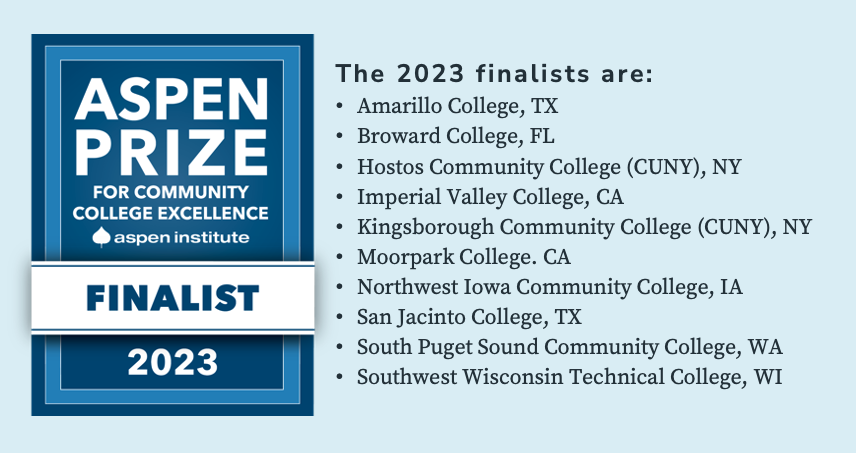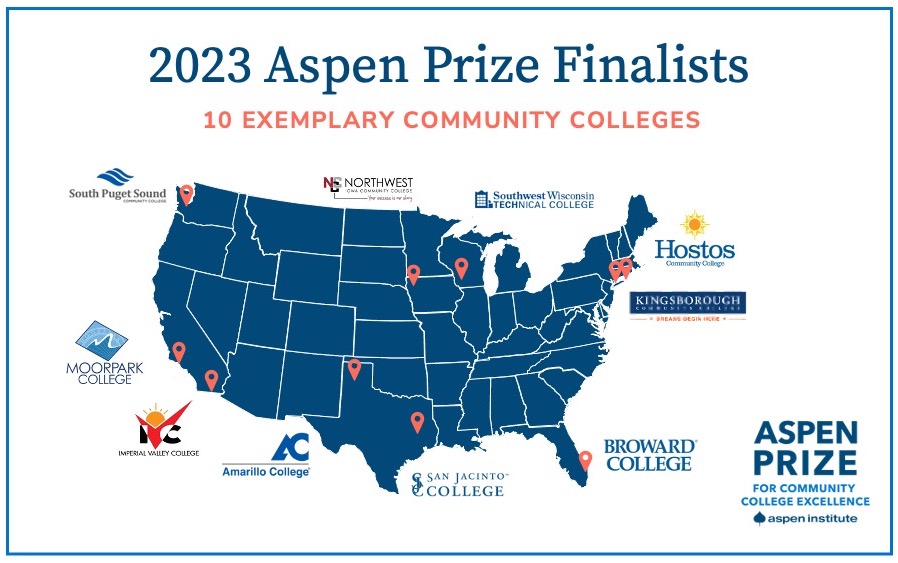Today we announced finalists for the 2023 Aspen Prize for Community College Excellence—10 outstanding colleges that remind us of the promise of our nation, 10 colleges that represent the potential of higher education to deliver on that promise.
 As America recovers from a devastating pandemic and grapples with a shifting economy, our community colleges are vital to ensuring that students of all backgrounds and ages can earn postsecondary credentials at a reasonable cost and prepare for jobs that pay family-sustaining wages. These 10 colleges are doing just that.
As America recovers from a devastating pandemic and grapples with a shifting economy, our community colleges are vital to ensuring that students of all backgrounds and ages can earn postsecondary credentials at a reasonable cost and prepare for jobs that pay family-sustaining wages. These 10 colleges are doing just that.
Of the nation’s 1,000-plus community colleges, 150 were invited to apply for the $1 million Aspen Prize last fall. A selection committee of higher education experts evaluated 109 applicant colleges’ performance in five domains: student learning, degree completion, transfer to a four-year university, workforce success, and equitable outcomes. From in-depth data, application narratives, and leadership interviews, 25 semifinalists emerged. After an additional close review of the data, the selection committee named 10 finalists.
The finalists are an impressively diverse group of exemplary community colleges, from a 2,700-student college in Iowa that grants primarily technical awards to a 57,000-student college in Florida focusing on transfer and bachelor’s degree attainment. No matter their location or size, excellent community colleges have something in common: They are devoted to developing students’ talents and to strengthening their communities and regional economies.

Momentum for improvement
The research we undertake for the Aspen Prize has continually shown us the capacity of community colleges to innovate, and that’s never been more true than over the past two years. Despite the upheavals in our lives, livelihoods, and communities, these colleges are keeping students on track. They are forging stronger partnerships with four-year institutions so students can effectively transfer and complete bachelor’s degrees; they are developing more sophisticated partnerships with employers to prepare graduates for high-paying careers.
The leaders of Prize-winning colleges do all this by creatively allocating financial resources to maximize impact, by transforming “human resources” into “human capital”, by setting a clear vision for equity in access and success, and—critically—by taking responsibility not just for seeing students to graduation, but for making sure they’re successful in the next steps, whether entering the workforce or transferring to a four-year institution.
These improvements aren’t restricted to Aspen Prize winners. This year we named 25 semifinalists for the first time, with the aim of recognizing the building momentum for reform. Overall, we’ve seen improved outcomes across the 150 colleges eligible for the Aspen Prize: Across the country during the last two years, the average three-year graduation and transfer-out rate for community colleges dropped, yet at those 150 eligible colleges, the completion rate rose three percentage points, to 45 percent. For students of color at those schools, the rate increased from 37 to 40 percent.
Reflections on excellence
The Aspen Prize, now in its seventh cycle, is foundational to our work at the Aspen Institute College Excellence Program. We learn from these exemplary schools and translate our research into actionable tools that we share with the field so that others can similarly improve.
As we make plans to visit these finalists to learn what’s working, we reflect on what previous Aspen Prize winners have been able to achieve on behalf of students:
Student Learning:
Aspen Prize colleges commit to a strategy for improving teaching and learning. They focus on inclusive pedagogy, promote active learning, create a sense of belonging in the classroom, and encourage academic rigor with supports. They achieve this with strong professional development opportunities and structures and incentives that support excellent instruction.
Valencia College (Winner, 2011) in Florida requires faculty to use data and experiment with teaching methods. Valencia has built this requirement into the professional development and tenure process, encouraging professors to analyze their own actions to drive student success within the classroom.
Completion and Transfer:
Aspen Prize colleges plot a clear path to success for their students, whether a workforce credential or a bachelor’s degree. They provide—and make sure students engage with—strong support, especially for those who need it most, starting before enrollment and going through graduation. Rather than relying on small initiatives to boost completion and job placement, these colleges create change through significant and scaled reform to improve the student experience and outcomes.
Indian River State College (Winner, 2019) in Florida implemented guided degree pathways with clear program maps and detailed course sequences—and paired that change with a total redesign of advising, moving to a caseload model where each advisor has a cohort of students to monitor and support. This combination of clarity and support has resulted in strong transfer rates.
Santa Barbara City College (Winner, 2013) makes an array of academic supports unavoidable, including a writing center (which is proven to improve course completion) and embedded peer tutors. Santa Barbara faculty know that students can’t make it to a four-year school if they are stuck in remedial classes, so the faculty designed the Express to Success program, which moves students in small learning communities through two remedial courses in the time typically devoted to one. It’s a counterintuitive effort—challenging students who are already behind to do even more. Yet the risk has paid off, with Express to Success students exceeding the remedial course completion rates of their peers by 30 percentage points.
Workforce Success:
Aspen Prize colleges help students explore options and establish career goals early in their journeys. They teach technical skills as well as what are often called “soft” or “personal” skills that students will need in their careers. They connect students to real-world work experiences. They partner with employers to design programs that launch graduates into successful careers; they consistently revisit regional labor market needs to ensure they are preparing students for high-demand, well-paying occupations—and they work to bring more opportunities to their regions.
Faculty and staff at Lake Area Technical College (Winner, 2017) in South Dakota regularly bring in industry representatives to assess the college’s curriculum and ensure graduates are prepared for high-demand jobs in the state. Employers work with campus leaders to develop meaningful internships, fund scholarships, donate sophisticated equipment, and hire graduates.
Walla Walla Community College (Winner, 2013) in Washington State helped advance a vision for economic development in the region, tethering every degree and credential to the community’s needs by frequently reviewing data on labor market outcomes, then adjusting program offerings.
Equitable Outcomes:
Community colleges, by definition, are inclusive institutions, offering accessible and affordable pathways to higher education. They are vital to opening doors to historically underserved populations: 51 percent of Hispanic students, 48 percent of Black students, and 67 percent of low-income students start at community college. Aspen Prize colleges use disaggregated data to analyze gaps in student access, find barriers to success, and make consequential change. They use data to better understand the groups they do serve and could serve, and to counter the legacy of exclusionary practices in higher education.
Miami Dade College (Winner, 2019) in Florida, for instance, redesigned the process for administering financial aid, making it simpler and more accessible. With just a single 10-minute application in addition to the FAFSA, students find if they are eligible for more than 300 institutional scholarships.
Excellent colleges aren’t just reforming around the edges
At the best colleges, every system is built on a bold student success vision and strategy: how faculty and staff are hired, engage in professional development, and are evaluated; how funds are allocated; how data is collected, analyzed, and used for improvement; how leaders work with each other and with partners in the community.
San Antonio College (Winner, 2021) in Texas encourages all faculty and staff take responsibility for the success of all students. Every semester, each faculty member reviews detailed, course-level student success data disaggregated by race and ethnicity. Instructors who need to improve their course success rates develop action plans for improvement, and may be mentored by a faculty member with a high success rate.
Santa Fe College (Winner, 2015) in Florida approaches reforms with students integrated as vocal stakeholders. When Santa Fe decided to implement an early alert system and personalized advising, they did it with a cross-functional committee, a comprehensive five-year budget, and a commitment to assess progress each term to see if the new system improved outcomes. In just the first year, these reforms helped retention rates rise 10 percentage points.

The road toward a winner
The next steps are exciting: This fall the Aspen team will start making site visits to the 10 finalists. During these in-depth visits, our team talks to college leaders, faculty, and students. We’ll learn about innovative wins and knotty challenges; we’ll observe how each community college responds creatively to its unique community. We look forward to seeing how these 10 finalists have evolved through the crisis of the pandemic, and what they envision for the future of their colleges, their communities, and, of course, their students.
And as we emerge from this phase of the pandemic, we celebrate these finalists. They are working not just to ensure that students get certification and college degrees, but also to ensure that their graduates make a difference for our democracy.
Rebecca Lavinson is a senior program associate and Ben Barrett is a senior program manager at the Aspen Institute College Excellence Program.
